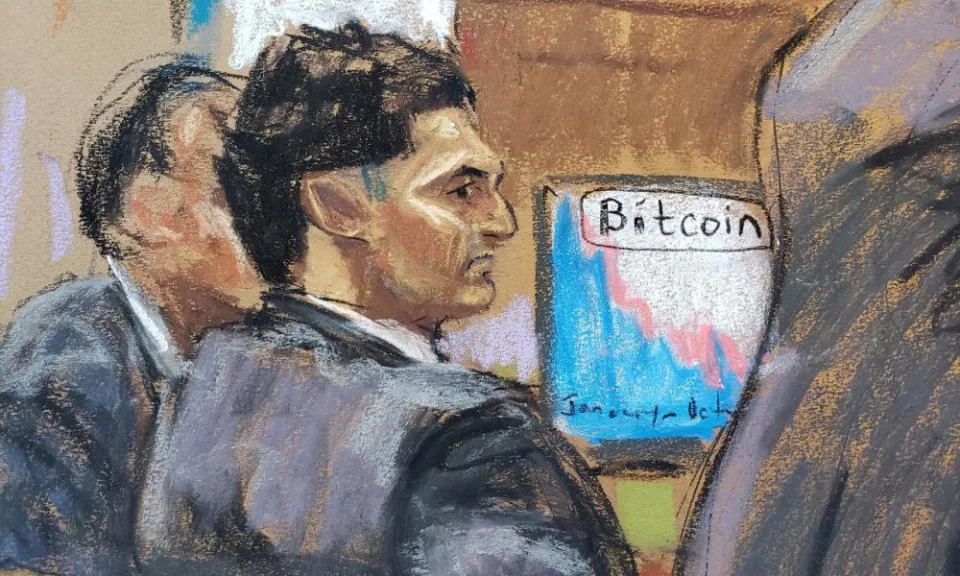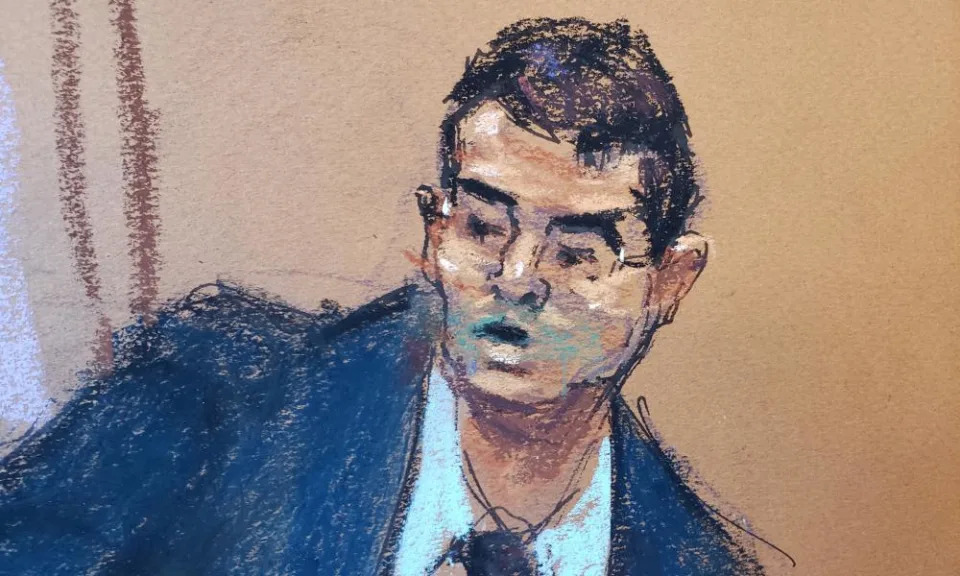CRIMINAL CAPITALI$M
FTX co-founder testifies he committed crimes with Sam Bankman-FriedVictoria Bekiempis in New York
Thu, 5 October 2023

Photograph: Jane Rosenberg/Reuters
Sam Bankman-Fried’s crypto fraud trial gained steam on Thursday when the co-founder of his fallen exchange, Gary Wang, took the stand as a government witness in Manhattan federal court.
His testimony came as the highly anticipated trial entered its third day. Bankman-Fried faces seven counts on fraud and conspiracy charges in relation to the implosion of his crypto exchange FTX and its related hedge fund, Alameda Research.
The prosecutor Nicolas Roos asked Wang outright if he had committed financial crimes while working at FTX.
Related: Sam Bankman-Fried built empire on ‘lies’, prosecutor says in fraud trial
“Yes,” Wang said. He then said the crimes included commodities and wire fraud.
“Who are the main people you committed these crimes with?”
“Sam Bankman-Fried, Nishad Singh and Caroline Ellison,” Wang said.
“Mr Wang, do you see any of the people you committed those crimes with in the courtroom today?”
Wang craned his neck and looked around, as if he were having trouble seeing who was in the courtroom. After a moment, he said: “Yes.”
“Who do you see?”
“Sam Bankman-Fried.”
Wang previously pleaded guilty to his role in FTX’s downfall. He is testifying under a plea agreement, according to court testimony.
Earlier on Thursday, one of Bankman-Fried’s former allies, Adam Yedidia, took the stand. Yedidia was the second witness to testify, and did so under an immunity order, meaning he cannot be charged based on his testimony, so long as it is truthful.

Adam Yedidia in this courtroom sketch. Photograph: Jane Rosenberg/Reuters
Yedidia testified about how the FTX founder helmed business operations – undermining defense claims that the disgraced crypto whiz was just a “math nerd” who fell in over his head.
“He was the CEO – so, sort of in charge of everything,” said Yedidia, in response to the prosecutor Danielle Sassoon’s question about Bankman-Fried’s role at FTX.
Yedidia also provided insight into Bankman-Fried’s relationship with Caroline Ellison, his sometimes girlfriend and Alameda Research chief turned government witness.
“Sometime in early 2019, the defendant told me that he and Caroline had had sex, and asked if it was a good idea to date,” Yedidia said, responding to Sassoon’s question about what Bankman-Fried had told him about Ellison.
“I said no.”
“How did he respond to that?” Sassoon said.
“He said he figured it was what [he] thought I would say,” Yedidia said.
Throughout much of the morning session, Bankman-Fried shook his right leg, giving him an air of subdued nervousness. At one point, Bankman-Fried drank water from a bottle so aggressively that the plastic crackled.
When Bankman-Fried entered the courtroom about 9.20am, he nodded to members of his legal team and his parents, who were seated in the gallery. His mother and father, both Stanford Law professors, took turns scribbling notes on a yellow legal pad.
Earlier on Thursday morning, Yedidia explained that he was Bankman-Fried’s friend from the Massachusetts Institute of Technology (MIT) and worked at FTX.
“We were close friends,” Yedidia said on Wednesday. They lived together at times and worked together, he said, which at one point came to include at FTX.
Sassoon used the close relationship of Yedidia and Bankman-Fried to explore the FTX inner circle’s luxe lifestyle and allege how it hid a house of cards. She asked Yedidia about their now infamous $35m apartment at the Albany, a tony community in the Bahamas.
Yedidia described it as a “luxury resort” on the western side of New Providence. Sassoon showed jurors a photo of the apartment, which revealed a sprawling living space with sparkling marble floors and a leggy black piano.
She also showed jurors a series of exchanges in a messaging group called “People of The House”. Yedidia said the rent on this apartment seemed like it would be very high, considering its multimillion-dollar valuation.
Bankman-Fried addressed rent costs. “Heh I’ve been mentally assuming that aggregate rent collected would be zero dollars …” he wrote, because Alameda was paying for it.
Yedidia said he last saw Bankman-Fried in November 2022 and had not spoken to him since. He described how he learned of FTX’s financial woes – and the dramatic turn of events that led him to step away from his longtime friend.
Yedidia was tasked with fixing a bug in company software that gave the appearance that Alameda owed FTX customers $16bn in 2022. He fixed the bug – only to discover that Alameda owed FTX $8bn in customer funds.
He initially offered his support to Bankman-Fried, but soon changed course.
The week that FTX declared bankruptcy, “I received a phone call from another developer at the company,” Yedidia said in explaining his departure. “I heard that Alameda Research had used FTX customer profits to pay back its loans to creditors.”
“After you learned that, what did you do?” Sassoon asked.
“I resigned,” Yedidia said.
Yedidia was asked why he was testifying with an immunity order.
“I was concerned that, as a developer for FTX, I may have unwittingly written a code that contributed to a crime,” he said.
On cross-examination, Bankman-Fried’s attorney Christian Everdell tried to dissuade any notion that his client was a dilettante who relished in ill-gained riches. Everdell asked Yedidia about Bankman-Fried’s spending habits.
“He didn’t buy, for example fancy watches, did he?”
“Not to my knowledge, no.”
“He didn’t buy an expensive sports car?”
“No.”
“He didn’t buy a yacht?”
“To my knowledge, he did not buy himself a yacht.”
Everdell also pressed Yedidia on Bankman-Fried’s manner of dress.
“I didn’t see him in fancy clothes,” Yedidia testified. “He would typically wear a T-shirt and shorts.”
He also tried to downplay their lavish digs in the Bahamas, where there were 10 people in the penthouse.
“This was essentially dorm living?” Everdell asked.
“It was similar to dorm living in some senses and different in others.”
The prosecutor also returned to Yedidia’s decision to leave FTX despite professing loyalty to Bankman-Fried. Why did his opinion change?
Related: Sam Bankman-Fried trial: ‘I may have unwittingly contributed to a crime’, FTX developer tells court – as it happened
“Well, FTX defrauded all of its customers,” he said.
The prosecutor Thane Rehn has portrayed Bankman-Fried as an unrepentant huckster who pocketed FTX customer funds for his own purposes – and to buoy Alameda as crypto’s volatility dealt it blow after blow.
“One year ago, it looked like Sam Bankman-Fried was on top of the world. He ran a huge company called FTX. He lived in a $30m apartment in the Bahamas. He jetted around the world on private planes. He hung out with celebrities like Tom Brady and politicians like Bill Clinton,” Rehn said in his opening.
“But all of that, all of it, was built on lies. Behind the curtain, Sam Bankman-Fried was not who he appeared to be. He was using his company, FTX, to commit fraud on a massive scale.”
Bankman-Fried has pleaded not guilty. During defense openings, Bankman-Fried’s lawyer painted him as a “nerd” who tried to do the right thing but was overwhelmed with a fast-growing company.
“Sam didn’t defraud anyone. Sam didn’t intend to defraud anyone. Sam acted in good faith,” the defense lawyer Mark Cohen said. “There was no theft.”
No comments:
Post a Comment